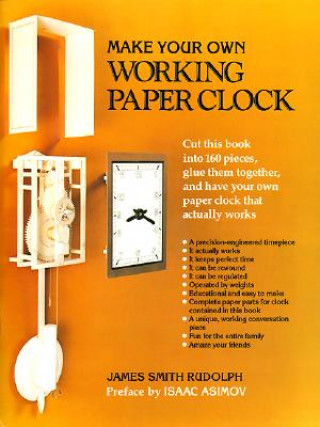
Dostawa
Doradca ds. zakupów
16 126 809 książek w 175 językach







Pokaż wszystkie języki (175)





Jednak się nie przyda? Nic nie szkodzi! U nas możesz zwrócić towar do 30 dni
 Bon prezentowy
O dowolnej wartości
Bon prezentowy
O dowolnej wartości
Bon prezentowy to zawsze dobry pomysł. Obdarowany może za bon prezentowy wybrać cokolwiek z naszej oferty.
Make Your Own Working Paper Clock
 Angielski
Angielski
 39 b
39 b
30 dni na zwrot towaru
Mogłoby Cię także zainteresować


Clocksby Isaac AsimovThrough most of history, people hardly felt the need of clocks. It seemed sufficient to consult one's own physiology to tell when one was hungry or sleepy, or to observe the general position of the sun in the sky during the day or that of the Big Dipper at night.Those who were meticulous enough to want something better searched for some regular motion that existed in nature or that could be contrived. In ancient times, the sundial was invented so that the passage of the shadow of a rod could be followed as the sun crossed the sky.Or else one could observe the extent to which a candle burned downward, or wait till a certain amount of sand had sifted through a small opening. Such devices could be used on cloudy days or at night, when the sun could not be seen and shadows were not observed.In ancient times, the best timepiece was the clepsydra, or water clock, which measured time by the regular dripping of water through a narrow opening. As water accumulated in the lower reservoir, a float carrying a pointer rose and marked the hours. The best water clocks were quite elaborate but few in number and fragile. They could not be relied on to tell time more closely than a fairly large fraction of an hour.In medieval Europe, the mechanical clock was invented. Clever arrangements of gears and wheels were devised that could be made to turn by weights attached to them. As the weights were pulled downward by the force of gravity, the wheels were forced to turn in a slow, regular manner. A pointer, properly attached to the wheels, marked the hours.These mechanical clocks were less delicate than water clocks and required less maintenance. They became commonin churches and monasteries and could be relied on to tell when to toll the bells for regular prayers or church attendance. (The very word "clock" is from the French cloche, meaning "bell.")Eventually, mechanical clocks were designed to strike the hour and even to chime
Informacje o książce
 Angielski
Angielski




 Jak kupować
Jak kupować














